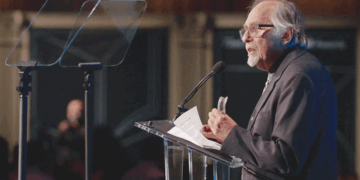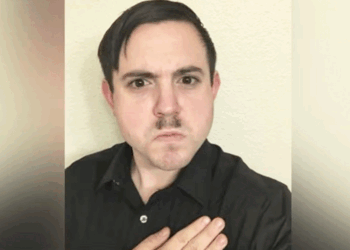In the final days of the 2024 election season, the discourse has coarsened. A case in point is Donald Trump’s Oct. 27 rally at Madison Square Garden, where a “comedian” named Tony Hinchcliffe made a benighted joke about Puerto Rico as a “floating island of garbage.”
Tucker Carlson referred to Vice President Kamala Harris — the daughter of an Indian mother and Jamaican father — as “the first Samoan-Malaysian, low-IQ former California prosecutor to ever be elected president.” Jews, Palestinians, Black people and Latinos also came up for racist and bigoted verbal abuse. In short, it was a Trump rally.

Trump, the GOP nominee for president, has been going hard against immigrants and undocumented migrants living in the United States. In late October, he started referring to this country as a “garbage can for the rest of the world.” If elected, Trump vows to deport 10 million undocumented residents. Presumably, this task would entail some type of police roundups and the creation of concentration camps. It’s a downbeat vision for America.
I hope that I’m wrong, but it looks like the 2024 elections will usher in a period of social instability in this country — whoever wins the presidency.
If Trump wins and begins to enact his policy agenda, such as it is, there will be a popular movement to counteract the repression. If Harris wins, there is a 100 percent chance that Trump will declare the results fraudulent, as he continues to harp on his 2020 loss as a case of an election that was “rigged and stolen.” His MAGA (Make America Great Again) followers will parrot his rhetoric and take their grievances to the streets. On Jan. 6, 2021, Stop the Steal movement activists and Christian nationalist groups organized a violent assault on the U.S. Capitol to stop Congress from certifying Electoral College votes. The next actions by Trump’s sycophantic stalwarts could be much more violent.
“Today the U.S. political situation radiates civil instability. Extremism stoked on the internet has generated the kind of stark disengagement with opposing positions that is conducive to violence,” Steven Simon (not the Minnesota secretary of state) and Jonathan Stevenson write in the Nov. 7, 2024, issue of The New York Review of Books.
In the article titled “The Perils of Civil Breakdown,” the authors continue: “Virulent groups are gaining traction by voicing intense hostility to a federal government perceived as heavy-handed and excessively protective of minorities — an attitude that has coursed through some parts of America for decades, just beneath the surface. Its roots reach back to the Civil War and the failure of Reconstruction, and it has been nourished by the Lost Cause myth, the lingering effects of Jim Crow, and a persistent strain of white supremacy. White Christians’ feelings of cultural besiegement and of a need to forcefully reassert their political power have sharpened racism and xenophobia and unequivocally correlate with support for Trump, political violence in general, and the January 6 assault in particular.”
Simon and Stevenson suggest that “myths comparable to those prevalent in America fueled right-wing opposition to the Weimar Republic, and that by the early 1930s a majority of Germans effectively supported extremist parties on the right or left, and centrist parties had been co-opted. Unlike post–World War I Germany, the United States has not just lost a devastating war and is not plagued by a valueless currency, but a similar politics of cultural despair seems to have consumed the Republican Party.”
The authors say that “possible provocations for a newly elected Trump to assert autocratic authority are easy to picture. Mass protests could erupt over a federal program of mass deportation or a renewed tolerance for racially tinged law enforcement excesses. Effectively shielded by the Supreme Court from criminal liability, Trump would have the license to try whatever he wanted through established bureaucratic channels, subject only to weakened structural and political checks. It is well short of outlandish to imagine him designating antifa activists as terrorists, invoking the Insurrection Act and declaring martial law, selectively suspending constitutional protections, and having opposition figures charged with sedition—all of which he contemplated in 2020 and supporters like Steve Bannon, retired general Mike Flynn, and Roger Stone have broadly advocated.”
A 2023 documentary, Against All Enemies, which is available to view on YouTube, examines how extremist right-wing groups have recruited military veterans to their cause. The film, which is directed by Charlie Sadoff, points out that these disaffected vets filled the ranks of groups like the Proud Boys, Oath Keepers and Patriot Front during the January 6 siege of the Capitol. Some active-duty military members and police officers also participated in the riot. The previously mentioned Michael Flynn, who served briefly as Trump’s national security adviser before pleading guilty to a charge of lying to the FBI, is a hero to many of the veterans aligned with far-right groups. Flynn espouses a variety of conspiratorial views, from the antisemitic QAnon dogma to Christian supremacism. He could have a role in a second Trump administration.
Getting back to the article by Simon and Stevenson, the authors state: “Last November Robert Kagan of the Brookings Institution published an op-ed in The Washington Post urgently alerting Americans to the possibility of a Trump dictatorship. Senator J.D. Vance, now Trump’s running mate, sent a letter to Attorney General Merrick Garland and Secretary of State Antony Blinken suggesting that Kagan be charged with insurrection or conspiracy. Today’s puerile political pandering could easily become tomorrow’s administrative reality.”
Perhaps, Vance, a puppet of conservative tech billionaires, could supplant Trump in a second term. As vice president, Vance could trigger the provision in the 25th Amendment that provides for the removal of a president who is “unable to discharge the powers and duties of his office” due to mental incapacity.
Finally, Trump has repeatedly puzzled over why American Jews vote Democratic. According to him, the 70 percent or so of Jews in the U.S. supporting Democratic candidates variously “hate Judaism” or should “have their heads examined.” More ominously, Trump said in a September speech that Jews will “have a lot to do” with a possible election loss.
So, when you cast your vote for president, remember that one side has put a target on your back.
Mordecai Specktor / editor [at] ajwnews [dot] com
The views expressed in this editorial are those of the author, and do not necessarily reflect the views of Minnesota Jewish Media LLC partners or employees of American Jewish World.
(American Jewish World, November 2024)





















